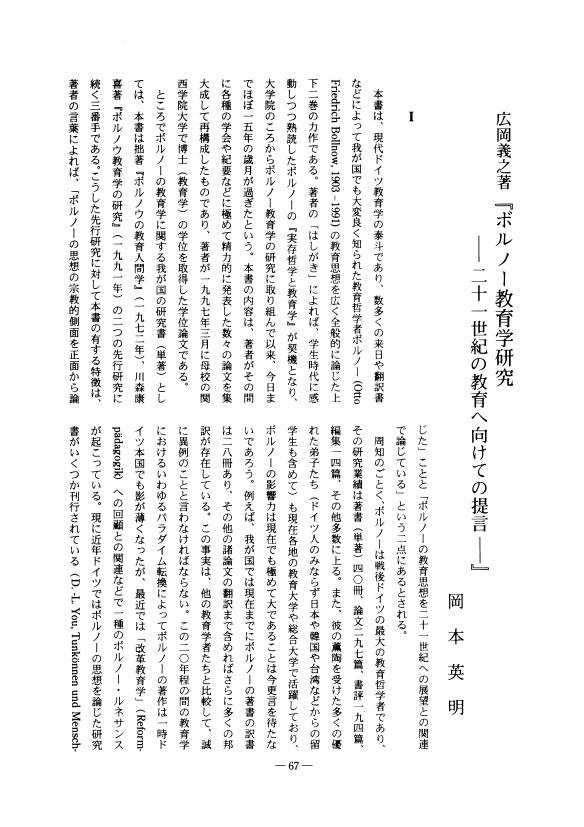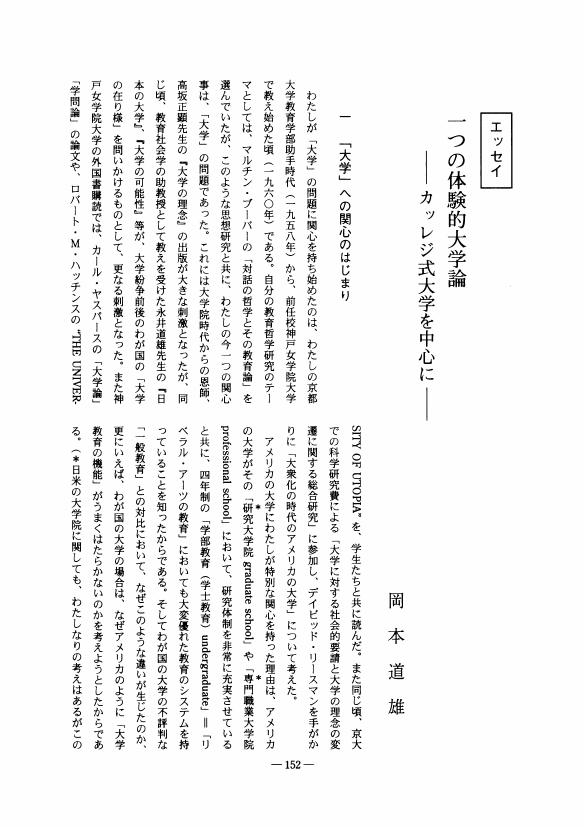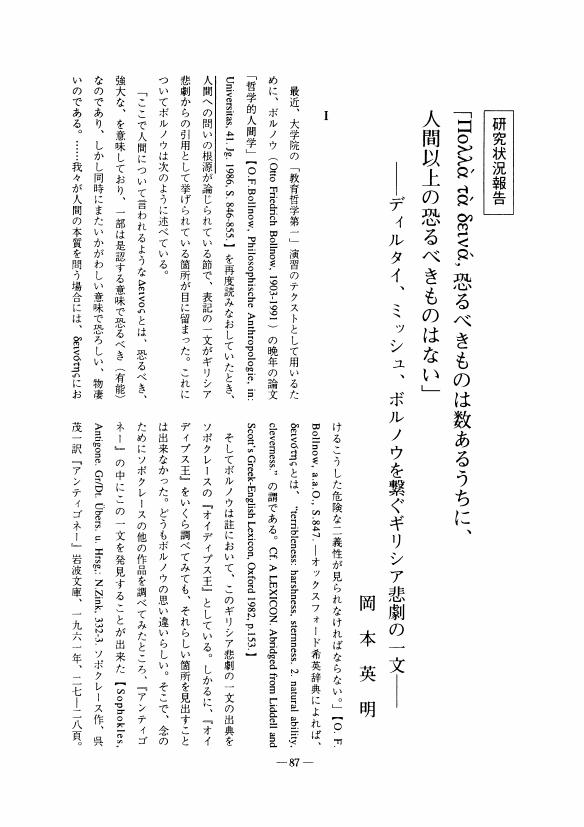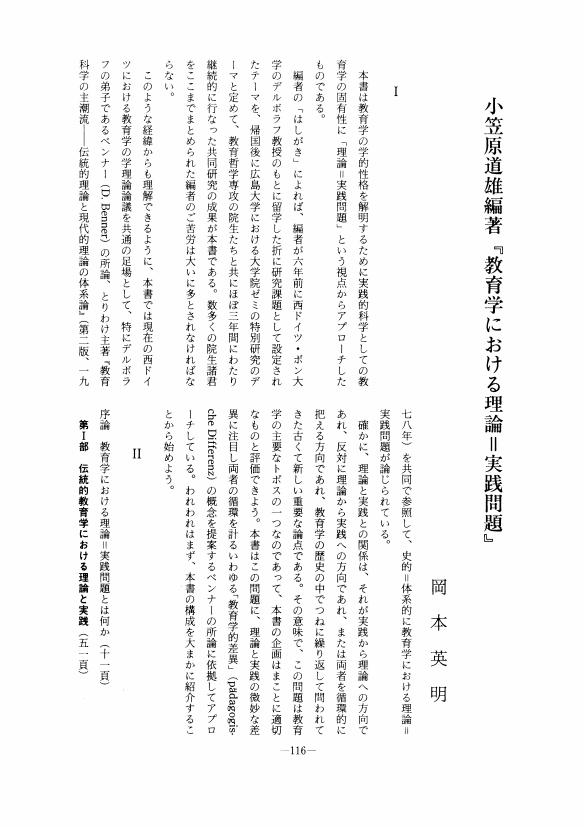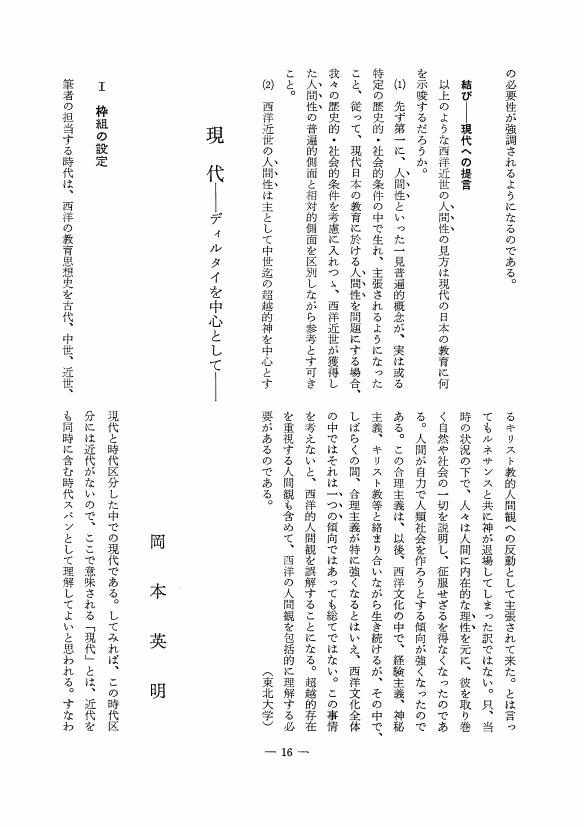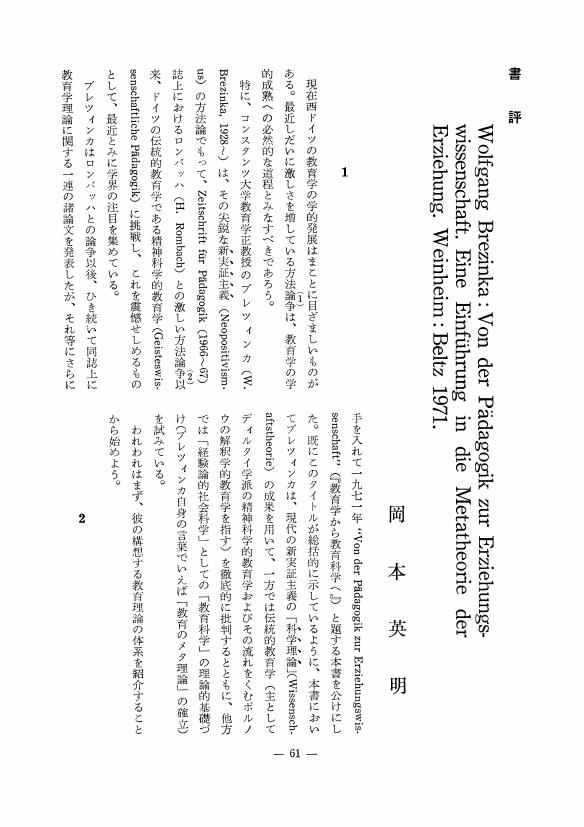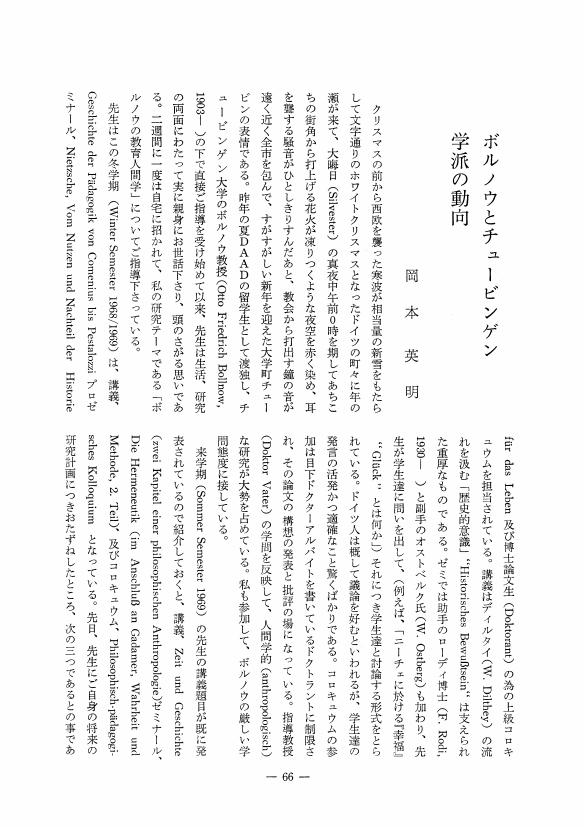1 0 0 0 OA 実在性と矛盾
- 著者
- 岡本 賢吾
- 出版者
- 東北哲学会
- 雑誌
- 東北哲学会年報 (ISSN:09139354)
- 巻号頁・発行日
- vol.8, pp.63-65, 1992-08-28 (Released:2018-02-28)
- 著者
- 岡本 英明
- 出版者
- The Japanese Society for the Philosophy of Education
- 雑誌
- 教育哲学研究 (ISSN:03873153)
- 巻号頁・発行日
- vol.2007, no.95, pp.130-132, 2007-05-10 (Released:2009-09-04)
1 0 0 0 OA ザルツマン著『蟹の書』のタイトル攷
- 著者
- 岡本 英明
- 出版者
- 教育哲学会
- 雑誌
- 教育哲学研究 (ISSN:03873153)
- 巻号頁・発行日
- vol.2004, no.89, pp.120-125, 2004-05-10 (Released:2009-09-04)
- 参考文献数
- 14
- 著者
- 岡本 英明
- 出版者
- The Japanese Society for the Philosophy of Education
- 雑誌
- 教育哲学研究 (ISSN:03873153)
- 巻号頁・発行日
- vol.2002, no.85, pp.123-124, 2002-05-10 (Released:2009-09-04)
1 0 0 0 OA 広岡義之著『ボルノー教育学研究-二十一世紀の教育へ向けての提言-』
- 著者
- 岡本 英明
- 出版者
- 教育哲学会
- 雑誌
- 教育哲学研究 (ISSN:03873153)
- 巻号頁・発行日
- vol.1998, no.78, pp.67-72, 1998-11-10 (Released:2009-09-04)
1 0 0 0 OA 一つの体験的大学論 カッレジ式大学を中心に
- 著者
- 岡本 道雄
- 出版者
- 教育哲学会
- 雑誌
- 教育哲学研究 (ISSN:03873153)
- 巻号頁・発行日
- vol.1997, no.76, pp.152-164, 1997-11-10 (Released:2009-09-04)
- 著者
- 岡本 英明
- 出版者
- 教育哲学会
- 雑誌
- 教育哲学研究 (ISSN:03873153)
- 巻号頁・発行日
- vol.1995, no.71, pp.87-90, 1995-05-10 (Released:2009-09-04)
1 0 0 0 OA 能勢榮譯註『莱因氏教育學』底本攷
- 著者
- 岡本 英明
- 出版者
- 教育哲学会
- 雑誌
- 教育哲学研究 (ISSN:03873153)
- 巻号頁・発行日
- vol.1990, no.61, pp.79-82, 1990-05-10 (Released:2009-09-04)
- 参考文献数
- 7
1 0 0 0 OA 解釈学的教育学の実践哲学的考察 トポス論、フロネーシス、レトリックを中心に
- 著者
- 岡本 英明
- 出版者
- 教育哲学会
- 雑誌
- 教育哲学研究 (ISSN:03873153)
- 巻号頁・発行日
- vol.1989, no.60, pp.1-15, 1989-11-10 (Released:2009-09-04)
- 参考文献数
- 42
In diesem Beitrag wird nach der Tragweite der Erkenntnismodelle der praktischen Philosophie für die Theoriebildung der hermeneutischen Pädagogik gefragt. Hier wird also versucht, die ursprtinglichen Leistungsmomente von Topik, phronesis und Rhetorik erneut in Betracht zu ziehen und im Hinblick auf ihre ingeniose Theoriebildungskraft den Charakter der Pädagogik wissenschaftstheoretisch zu explizieren. Zuerst soll die Bedeutung der Topik des Aristoteles in der hermeneutischen Pädagogik klar ans Licht gebracht werden. Wie Vico den “sensus communis” gemaB der alten topischen Methode gegen den Cartesianismus betatigt hat, ermoglicht die Kunst der Topik allein die 'Erfindung' (inventio) der für die Praxis entscheidenden Gesichtspunkte.Sodann soll die Funktion von Topik/Takt als genuine wissenschaftstheoretische Leistung Herbarts herausgestellt werden, im Anschluß an J. L. Blass, der den konstitutiven Zusammenhang von Topik und Pädagogik im logisch-kombinatorischen Bau der “Allgemeinen Pädagogik” Herbarts aufgezeigt hat.Drittens soll die enge Verwandtschaft zwischen Hermeneutik und Praxeologie J. Derbolays bestätigt werden, indem wir darauf aufmerksam machen, daß die phronesis <prudentia> als die Urteilskraft im Handeln eine zwischen Theorie und Praxis vermittelnde Kompetenz hat.Schließlich wird weiter erortert, wie der Sinn und Wert der Rhetorik. in der Hermeneutik gerechtfertigt werden kann. Damit wird die Hermeneutik als Rhetorik transparent gemacht, die zur Erhellung des Charakters der Pädagogik beitragen sollte.
1 0 0 0 OA 思想構造からのアプローチ
- 著者
- 岡本 道雄
- 出版者
- 教育哲学会
- 雑誌
- 教育哲学研究 (ISSN:03873153)
- 巻号頁・発行日
- vol.1989, no.59, pp.25-29, 1989-05-10 (Released:2009-09-04)
- 参考文献数
- 8
1 0 0 0 OA 人間像の概念とその問題点
- 著者
- 岡本 英明
- 出版者
- 教育哲学会
- 雑誌
- 教育哲学研究 (ISSN:03873153)
- 巻号頁・発行日
- vol.1988, no.57, pp.5-9, 1988-05-10 (Released:2009-09-04)
- 参考文献数
- 13
1 0 0 0 OA 小笠原道雄編著『教育学における理論=実践問題』
- 著者
- 岡本 英明
- 出版者
- 教育哲学会
- 雑誌
- 教育哲学研究 (ISSN:03873153)
- 巻号頁・発行日
- vol.1986, no.53, pp.116-119, 1986-05-10 (Released:2009-09-04)
1 0 0 0 OA 解釈学の立場から
- 著者
- 岡本 英明
- 出版者
- 教育哲学会
- 雑誌
- 教育哲学研究 (ISSN:03873153)
- 巻号頁・発行日
- vol.1986, no.53, pp.18-22, 1986-05-10 (Released:2009-09-04)
- 参考文献数
- 12
解釈学はもと文献の解釈技術から出発し、十九世紀初頭においてシュライエルマッヘルなどにおいて大きく開花し、さらにディルタイによって精神諸科学の基礎理論として一般化され、大きな影響力を及ぼした。現在ではボルノウやガダマーの尽力によって、哲学的解釈学ないし解釈学的哲学にまで発展してきている。そこからまた、教育学においては「解釈学的教育学」 (hermeneutische paädagogik) が言われている。解釈学的方法は、具体的にはたとえば、一、理解できないテクストの個所を全体との関連で理解する。一、個々の言明に、それとパラレルな個所の他の言明を引き寄せる。一、中途半端な思想を、原著者を越えて解釈者の努力で考え抜き、そこから原著者の意図をよりよく理解する。一、歴史的事情を取り込む。伝記的、心理学的、社会学的視点を考慮する。などが挙げられるが、ここでは本テーマとかかわって、特に次の三点を取り上げて論じることにしたい。I 史的=体系的アプローチII Besser-Verstehen(よりよく理解すること)III トポス論的アプローチ
1 0 0 0 OA 現代 ディルタイを中心として
- 著者
- 岡本 英明
- 出版者
- 教育哲学会
- 雑誌
- 教育哲学研究 (ISSN:03873153)
- 巻号頁・発行日
- vol.1984, no.49, pp.16-20, 1984-05-10 (Released:2009-09-04)
- 参考文献数
- 12
1 0 0 0 OA へーゲルの〈疎外論〉の検討 陶冶論的解釈の批判
- 著者
- 岡本 明人
- 出版者
- 教育哲学会
- 雑誌
- 教育哲学研究 (ISSN:03873153)
- 巻号頁・発行日
- vol.1983, no.48, pp.1-14, 1983-11-05 (Released:2010-05-07)
- 参考文献数
- 31
This paper aims at a critique of the following Hegel interpretation of some educational theorists belonging to the geisteswissenschaftliche school. It is an interpretation in terms of a formation theory of Hegel's philosophy of 'spirit' explaining the self-emanation of spirit as 'alienation'.I call this interpretation a 'generalization of the particular' and criticize it on the following two accounts : (1) This theory misinterprets the pedagogical meaning of Hegel's alienation of spirit as if it meant a theory of self-alienation of spirit.(2) This theory presupposes that becoming 'socialized leads man immediately to autonomous thinking or to 'individualization'.
1 0 0 0 OA 解釈学的=現象学的立場からの考察
- 著者
- 岡本 英明
- 出版者
- 教育哲学会
- 雑誌
- 教育哲学研究 (ISSN:03873153)
- 巻号頁・発行日
- vol.1978, no.37, pp.7-13, 1978-05-10 (Released:2009-09-04)
Questions and doubts about the scientific nature of pedagogy are as old as the history of pedagogy and are at the center of pedagogy even now. This may be due to the fact that educational reality and the educational situation form a non-technical complex entity which ist not sufficiently explained by means of a technical model construed and controlled in a semi-logical fashion. Therefore the fact that the quarrel around the scientific character of pedagogy is still going on, must not be blamed on the scientific backwardness of pedagogy. The problem is rather a matter of being more deeply concerned about the essence of education.In this discussion the attempt is made to scrutinize the problem of the scientific nature of pedagogy, within the frame of our viewpoint of hermeneutic =phenomenological theory and comparing it with the theory of theoretical analysis and the theory of social criticism covering in the discussion the following five points.1. The connection between “understanding life” and scientificness;2. The unbiasedness and objectivity of science;3. The connection between factual research and normative research;4. The hermeneutic character of concept formation;5. Critical theory and hermeneutics.
- 著者
- 岡本 英明
- 出版者
- The Japanese Society for the Philosophy of Education
- 雑誌
- 教育哲学研究 (ISSN:03873153)
- 巻号頁・発行日
- vol.1974, no.29, pp.61-67, 1974-05-15 (Released:2010-05-07)
- 参考文献数
- 17
1 0 0 0 OA ボルノウの教育人間学について
- 著者
- 岡本 英明
- 出版者
- 教育哲学会
- 雑誌
- 教育哲学研究 (ISSN:03873153)
- 巻号頁・発行日
- vol.1970, no.22, pp.51-63, 1970-10-10 (Released:2009-09-04)
- 参考文献数
- 25
1 0 0 0 OA ボルノウとチュービンゲン学派の動向
- 著者
- 岡本 英明
- 出版者
- 教育哲学会
- 雑誌
- 教育哲学研究 (ISSN:03873153)
- 巻号頁・発行日
- vol.1969, no.19, pp.66-69, 1969-05-15 (Released:2009-09-04)
- 参考文献数
- 7





